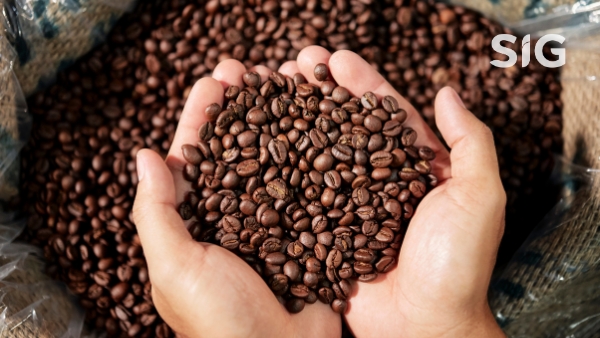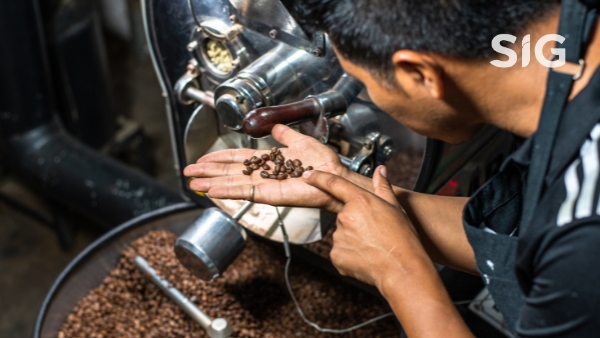Kopi bukan hanya sekedar minuman, bagi sebagian orang meminum secangkir kopi sudah seperti ritual rutin yang harus dilakukan setiap harinya. Kopi juga merupakan teman bagi beberapa orang, teman setia yang selalu ada seperti menemani bekerja, menemani di waktu melepas penat sendiri, hingga menjadi pelengkap obrolan dikala bersama kawan-kawan. Dari warung kecil hingga cafe mewah hampir pasti kita dapat menemukan kopi. Meskipun dapat disajikan sebagai kopi panas dan es kopi, kopi tetaplah selalu membawa kehangatan dihati.
Tentu bagi penikmat kopi tidak asing dengan teknik penyajian kopi “Japanese”. Selain teh, masyarakat Jepang juga memiliki budaya minum kopi. Tetapi, dibalik popularitas kopi yang luar biasa tinggi, ada tanggung jawab besar untuk memastikan bahwa setiap biji kopi yang dinikmati aman dan berkualitas, terutama saat memasuki pasar internasional seperti Jepang. Negara ini dikenal dengan standar keamanan pangannya yang ketat, sehingga kopi Indonesia harus melalui berbagai tahap pengujian sebelum dapat diterima. Salah satu tantangan utama adalah pengujian residu pestisida, khususnya Isoprocarb dan 2,4-Dichlorophenoxyacetic Acid (2,4-D).

Tantangan utama adalah pengujian residu pestisida, terutama Isoprocarb dan 2,4-Dichlorophenoxyacetic Acid (2,4-D).
Apa Itu Isoprocarb dan 2,4-D?
Isoprocarb: Merupakan pestisida yang sering digunakan untuk mengendalikan hama pada tanaman kopi. Residu yang tersisa pada produk dapat berdampak negatif terhadap kesehatan manusia jika melebihi batas yang diperbolehkan.
2,4-Dichlorophenoxyacetic Acid (2,4-D): Merupakan herbisida yang biasa digunakan untuk mengendalikan gulma. Meskipun efektif, residu yang tersisa juga harus diawasi karena dapat menyebabkan gangguan kesehatan, seperti masalah hormonal atau risiko lainnya.
Mengapa Pengujian Penting?
Pemerintah di Jepang menetapkan batas maksimum residu (MRL) sebesar 0,01 ppm untuk kedua zat tersebut. Standar ini jauh lebih ketat dibandingkan banyak negara lain, mencerminkan dedikasi Jepang terhadap keamanan pangan.
Ketatnya peraturan yang dibuat oleh Jepang haruslah dijadikan pembuktian untuk meningkatkan daya saing Kopi Indonesia. Dengan memenuhi standar residu ini, kopi Indonesia tidak hanya diterima di Jepang tetapi juga lebih dipercaya oleh pasar global lainnya. Apabila semua standar telah dipenuhi maka dapat mencegah penolakan ekspor: Tanpa pengujian yang valid, risiko penolakan di pelabuhan tujuan meningkat, yang dapat merugikan eksportir secara finansial.
SIG sebagai Mitra Pengujian Terpercaya
Memastikan bahwa kopi yang akan dikirimkan ke Jepang memiliki kualitas yang tinggi dan aman maka perlu dilakukan pengujian residu pestisida. Pengujian harus dilakukan di laboratorium yang diakui oleh Kementerian Kesehatan, Tenaga Kerja, dan Kesejahteraan Jepang (MHLW). Salah satu laboratorium terpercaya di Indonesia adalah SIG.
Keunggulan SIG:
- Fasilitas Modern: SIG dilengkapi teknologi canggih untuk memastikan hasil pengujian yang akurat dan sesuai standar internasional.
- Tenaga Ahli Berpengalaman: SIG memiliki tim profesional yang kompeten dalam melakukan pengujian residu pestisida, termasuk Isoprocarb dan 2,4-D.
- Telah tersertifikasi Ministry of Health, Labour, and Welfare of Japan (MHLW): SIG telah terdaftar di MHLW Jepang sejak Maret 2023, hal ini memastikan bahwa hasil uji SIG telah dapat diterima oleh pasar internasional.
Manfaat Pengujian bagi Eksportir
- Memastikan Kepatuhan Regulasi: Hasil uji SIG membantu eksportir memastikan bahwa kopi mereka memenuhi standar keamanan pangan Jepang.
- Meningkatkan Nilai Tambah: Produk yang diuji dan bersertifikat lebih mudah mendapatkan kepercayaan dari pembeli.
- Meningkatkan Reputasi: Kepatuhan terhadap standar internasional menunjukkan komitmen eksportir terhadap kualitas dan tanggung jawab.
- Menghindari Kerugian Finansial: Pengujian awal dapat mencegah risiko penolakan atau retur produk di pelabuhan tujuan.

Dengan SIG, Indonesia memiliki peluang besar untuk terus menjadi pemain kunci dalam industri kopi global.
Pecinta Kopi aware dengan Keamanan Pangan
Bagi pecinta kopi, setiap tegukan yang dinikmati mengandung kisah panjang: dari biji kopi yang ditanam petani, proses pengolahan yang cermat, hingga pengiriman ke berbagai belahan dunia. Namun, kisah ini juga mencakup tanggung jawab untuk memastikan kopi yang dinikmati aman bagi konsumen. Pengujian residu Isoprocarb dan 2,4-D bukan hanya kewajiban teknis tetapi juga bentuk perlindungan bagi konsumen sekaligus strategi untuk meningkatkan daya saing kopi Indonesia.
Bersama SIG, Indonesia memiliki kesempatan besar untuk terus menjadi salah satu pemain utama dalam industri kopi dunia. Melalui kepatuhan terhadap standar ini, kopi Indonesia tidak hanya mempertahankan akses ke pasar Jepang tetapi juga mengukuhkan reputasinya sebagai salah satu produsen kopi terbaik di dunia.
Kesimpulan
Budaya minum kopi yang mendunia memberikan peluang besar bagi kopi Indonesia untuk terus berkembang di pasar internasional. Namun, peluang ini juga disertai tantangan untuk memastikan kualitas dan keamanan produk. Pengujian residu pestisida, seperti Isoprocarb dan 2,4-D, menjadi langkah penting untuk memenuhi standar keamanan pangan, terutama di pasar Jepang. Dengan dukungan Saraswanti Indo Genetech, eksportir kopi Indonesia dapat memastikan produknya memenuhi standar internasional, memberikan rasa aman bagi konsumen, dan menjaga reputasi Indonesia sebagai salah satu produsen kopi terbaik dunia.
Informasi lebih lanjut mengenai layanan pengujian, kunjungi website kami siglaboratory.com atau datang langsung ke Graha SIG, Jl Rasamala No. 20, Taman Yasmin, Bogor, Jawa Barat 16113. Mencari lab pengujian terpercaya? Hubungi kami 082111516516

